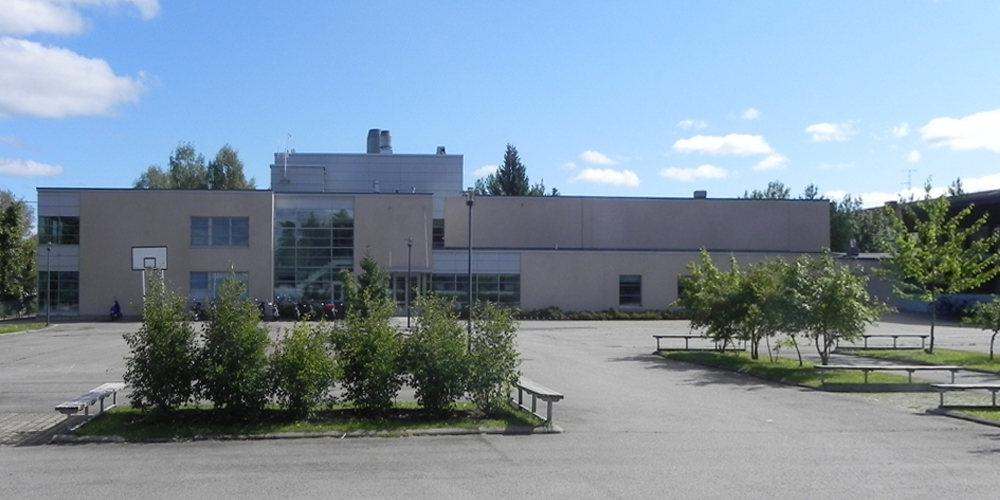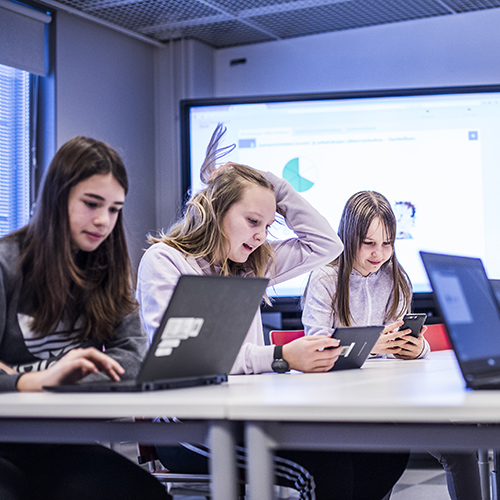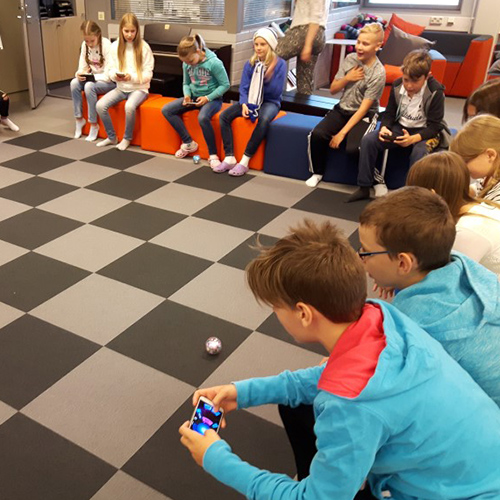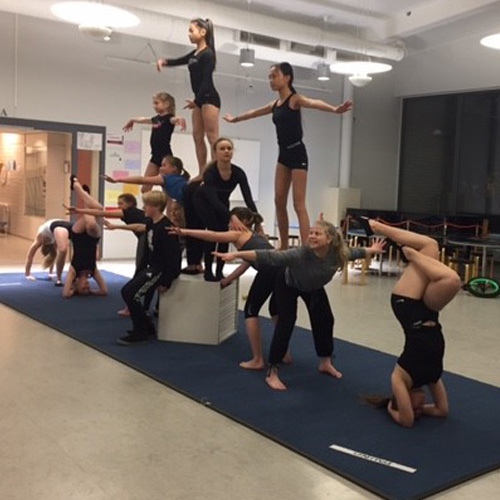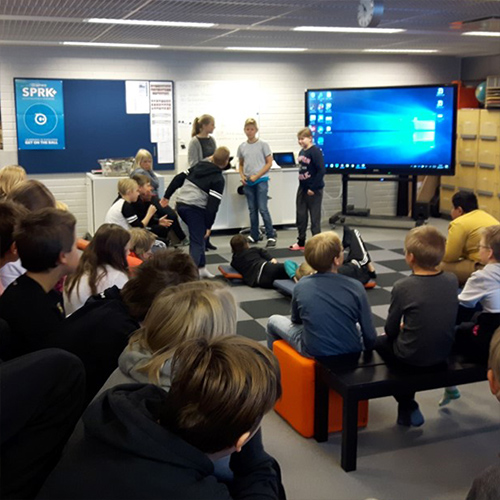The Tampere University
Teacher Training School
The Teacher Training School trains future teachers in a very structured way. Administratively, the school is part of the Tampere University Faculty of Education and Culture. In all other respects, the school enjoys great independence. There are 900 students in the Teacher Training School, and every year around 300 student teachers complete their training at this institution.
The close relationship between theory and practice forms the basis of the entire concept of teacher education, and therefore educational and didactic theories are applied in practice. The functional connection between the Teacher Training School, Faculty of Education and Culture and the other university departments allows student teachers to apply in practice the theoretical knowledge they have gained, right from the early stages of their studies.
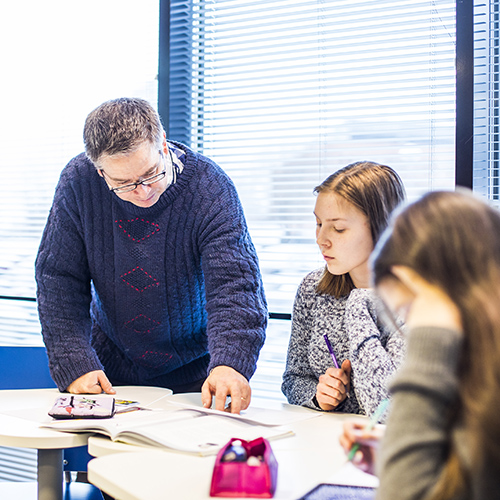 Teacher Training School in general
Teacher Training School in general
The Tampere University Teacher Training School is affiliated with the Faculty of Education, and it works in close collaboration with the university in pedagogy and research.
The Teacher Training School offers basic education (grades 1–9) as well as high school education. In addition to teaching, teacher training schools are responsible for offering teacher training and supervision of the training, opportunities to carry out experiments and research as well as further education.
The aim of the Tampere University Teacher Training School is to engage in high-quality teacher training and close collaboration with the university. Additionally, the school ensures high-quality curriculum work and teaching and develops multi-faceted teacher training as well as the use of educational technology.
The basis of the curriculum is founded upon Finnish education traditions whereby studying and learning reform society and culture.
We at the Tampere University Teacher Training School wish to emphasize equality, cultural diversity, community, safety, tolerance and fairness. We highly regard and reinforce active responsibility as well as a responsible and critical attitude towards taking care of shared issues and our shared environment. We respect the diversity of nature and endeavor to preserve the viability of Earth. We also promote the strengthening of self-image and human rights. Participation, proactivity and community are emphasized in all of our school’s activities. We respect, promote and pursue the set of values of a civilized people, which is built upon truth, humanity and justice.
The Tampere University Teacher Training School is a Unesco school. Teaching endeavors to acknowledge global citizenship and sustainable development in all of the different age groups. The purpose of global education is to promote understanding between cultures and growth as a global citizen. Our goal is to help students conceive the world’s various cultures as a fortune. Students learn about the manners of different cultures as well as the economic, social and geographic factors as forces that enrich, impoverish or build cultures.
Administrative Principal Östring Heidi (heidi.ostring@tuni.fi) is responsible for the activities at the Tampere University Teacher Training School.
Levels of education
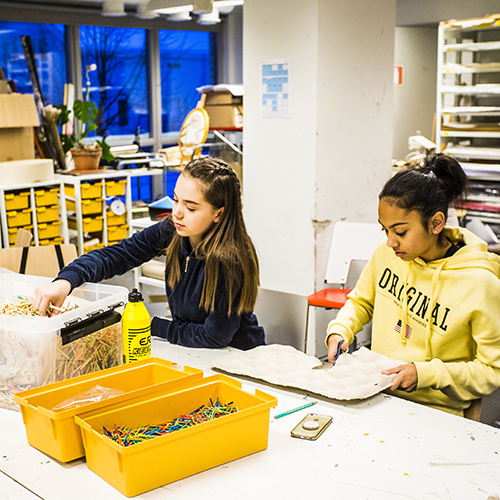 Elementary school
Elementary school
The elementary school (grades 1–6) has approximately 400 students. The students’ ages are between 7 and 12. The students are taught by class teachers and, in some subjects, by subject teachers. Some of the classes have an emphasis on music where the students study music more than the other classes, and music is also integrated in other subjects. Our elementary school offers a wide range of languages to study, e.g. English, German or French in addition to Swedish, which is compulsory.
Principal Kirsi-Liisa Koskinen-Sinisalo is responsible for the activities at the elementary school.
Junior high school
The junior high school (grades 7–9) has approximately 300 students. The students’ ages are between 13 and 16. Because we offer studies in specialized areas, students from other areas around Tampere also apply to our school.
Students are taught by subject teachers and each class has a homeroom teacher who is responsible for the students’ administrative (attendance, etc.) and other issues.
The junior high school specializes in music and circus art. Teaching in circus art is implemented in collaboration with the local circus company, Sorin Sirkus. Classes that study according to a specialized curriculum receive more instruction in the area of specialization than the other classes and it is also integrated in other subjects.
Principal Jussi Karjalainen is responsible for the activities at the junior high school.
High school
The high school affiliated with the Tampere University Teacher Training School has approximately 250 students. The students’ ages are, for the most part, between 16 and 19. Students generally complete their high school studies in three years, but completing them in 2.5–4 years is also possible.
Each high school student studies according to their own personal study plan. In Finland, high school teaching is course-based and there are no classes as such. Teaching is organized according to subject and the teachers are subject teachers. The size of the groups in each course depends on the subject. The size of most of the groups is about 27 students.
The high school offers two areas of emphasis: economics and business and circus art. Each year, one third of the new students are chosen for the economics and business track. They form their own group and their studies include varied advance courses in social studies. Teaching in circus art is implemented in collaboration with the local circus company, Sorin Sirkus, which is a local youth circus. Each year, ten to twelve new high school students are chosen for the circus art track.
Upon completion of their studies, high school students complete a matriculation examination. The examination comprises four or more tests, which students may do three consecutive examination times. There are two examination times per year. Once a student has completed the courses required to receive a diploma and the matriculation examination, (s)he is entitled to continue on to higher education studies.
Principal Heidi Östring is responsible for the activities at the high school.
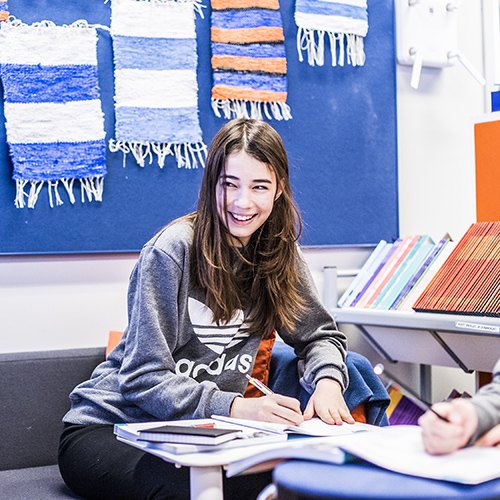 Student services
Student services
All of the students in our school are entitled to healthcare, counselling and psychology services. These services comprise our student services. Student services also include a communal dimension that aims to promote the wellbeing of the entire school. Communal student services are a part of the entire school culture and activities which promote students’ participation, learning, wellbeing and health.
A student may seek student services independently, at the request of a guardian or a school employee may refer a student to the school services.
![]()
Learning support
We offer support to our students according to the three support categories in the national curriculum: general support, intensified support and special support based on observations, assessment and studies in everyday school work. Guardians are important partners in collaboration when considering the need for and organization of support.
Support for a student is generally given in his/her own class (basic education). Part-time special education may be included in a student’s form of support in all phases. Support may also be in the form of preventive support. Part-time special education may be periodic, in groups and support a class’s needs for differentiation more broadly.
All teachers are responsible for assessing a student’s need for support and providing support.
At the Tampere University Teacher Training School, special education teachers provide support in learning.
![]()
International activities
Since 1984, Tampere University Teacher Training School has been a Unesco school. Various projects that develop different forms of collaboration in Europe and Asia, as well as the school and teachers’ professional skills, are carried out within EU projects and as separate projects together with the Faculty of Education. Our international activities are evident in the various school subjects, foreign exchanges that our teachers, student teachers and older students engage in as well as in the international projects that are ongoing at any given time. We organize visits for researchers and education professionals upon agreement.
To agree on a visit, contact Administrative Principal Heidi Östring (heidi.ostring@tuni.fi).
![]()
Exporting education
We engage in the export of education primarily with FinUni, a conglomerate of the Universities of Tampere, Turku and Eastern Finland. Activities have concentrated on the export of master’s degree programs and further education programs for teachers and principals. International training for class and subject teachers is organized through separate collaboration agreements.
Possible inquiries: Administrative Principal Heidi Östring (heidi.ostring@tuni.fi).
![]()
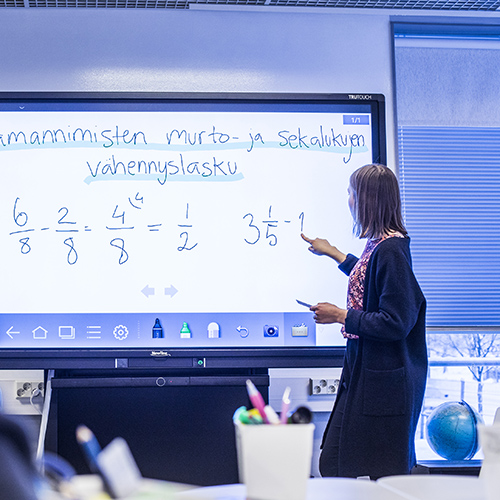 Teacher training
Teacher training
The close relationship between theory and practice forms the basis of the entire concept of teacher education, and therefore educational and didactic theories are applied in practice.
The functional connection between the Teacher Training School, Faculty of Education and Culture and the other university departments allows student teachers to apply in practice the theoretical knowledge they have gained, right from the early stages of their studies.
![]()
Supervising teacher training
Student teachers’ lifelong professional development is initiated through qualified teacher training supervision. Development requires strong commitment, being active and taking initiative, which the training supervisors support. The support of growth is substantiated in regular sessions of reflection with a student or group of students. During these interactive sessions, questions pertaining to education and teaching are addressed and bridges between theory and practice are constructed.
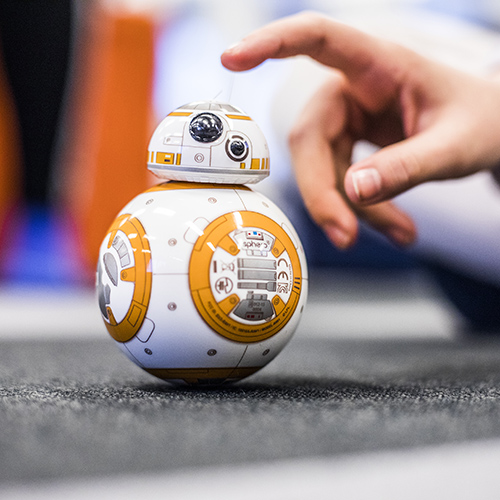 Research and development
Research and development
The Teacher Training School is responsible for activities involving experiments and research. Existing research information is applied at the school, and it is involved in collaboration with universities and other organizations and also functions as an environment for development, experimentation and research for its own employees and other researchers. Research involves pedagogic development and different learning environments and work methods, such as the effective and pedagogic use of new technology. Our school is active in the network of teacher training schools (enorssi) and in joint research and experimentation activities with other teacher training schools.
By empowering student teachers to take part in research and development, we strive to teach future class and subject teachers to develop their work with a research-based approach.
Current themes in research, experimentation and development include the development of students’ opportunities to take initiative, development of assessment of learning and training, multiliteracy, digitization in teaching and programming.
Administrative Principal Heidi Östring can be contacted regarding permission to do research at the school.

